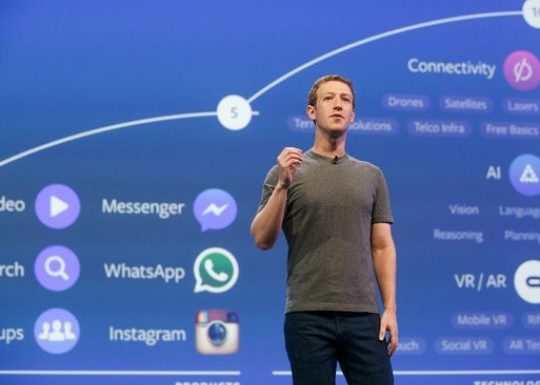
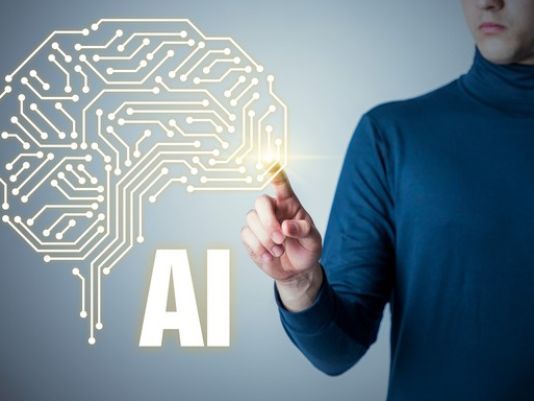
SAN FRANCISCO — Artificial intelligence. Machine learning. Knowledge engineering.
Call it what you want, but AI by any name had the tech world uniquely divided in 2017, and the new year isn’t likely to bring any quick resolutions.
In case you missed it, the fiery debate over AI’s potential impact on society was encapsulated by the opinions of two bold-face Silicon Valley names.
Tesla and SpaceX CEO Elon Musk told the National Governors Association this fall that his exposure to AI technology suggests it poses “a fundamental risk to the existence of human civilization.”
Facebook founder Mark Zuckerberg parried such doomsday talk — which would include cosmologist Stephen Hawking’s view that AI could prove “the worst event in the history of civilization” — with a video post calling such negative talk “pretty irresponsible.”
As the war of words raged, AI continued its creep into our daily lives, from the new facial recognition software in Apple’s iPhone X to the increasingly savvy responses from digital assistants Siri, Alexa and Cortana.
With the amount of often personal information fed by consumers into cloud-based brains compounding exponentially, companies such as Facebook and Google are poised to have unprecedented insights into, and leverage over, our lives.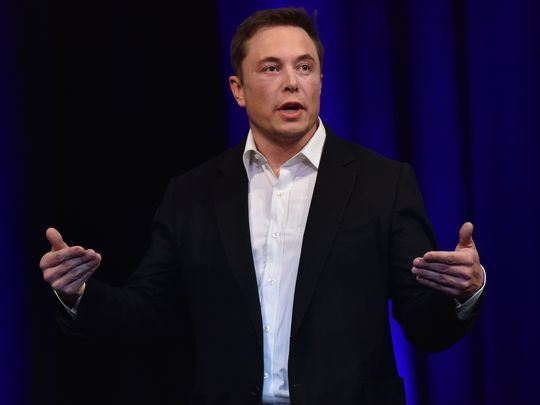
So which is it — are we heading into a glorious tech-enabled future where many menial tasks will be handled by savant machines, or one where the robots will have taken over for us woefully underpowered humans?
USA TODAY reached out to a number of artificial intelligence stakeholders to get their view on AI, friend or foe.
The conclusion: Excitement over AI’s potentially positive impacts seems, for now, adequately tempered by an acknowledgement that scientists need to stay vigilant about how such technology is developed, to ensure bias is eliminated and control is retained.
AI watchdog groups on the rise
“Innovation has generally liberated humans to be more productive,” says Congressman John Delaney, D-Md. Last fall, along with colleague Pete Olson, R-Texas, Delaney launched the AI Caucus, whose mission is to inform policymakers about the technological, economic and social impacts of AI.
Delaney says there are “a million conversations that can happen between now and the Terminator arriving,” referring to the apocalyptic film in which machines attempt to exterminate humans.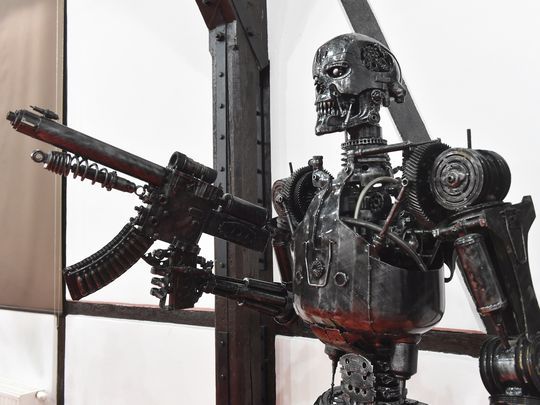
Although he says he is particularly concerned about retraining workers for an AI-rife future, “I don’t prescribe to a doomsday scenario.”
There are in fact a growing number of groups being formed to try to ensure that dismal future never comes to pass.
These include AI Now, which is led by New York University researcher Kate Crawford, who last year warned attendees at SXSW of the possible rise of fascist AI. There’s also OpenAI, a Musk-backed research outfit, and the Partnership on AI, whose members include Google, Facebook, Apple, Amazon, IBM and Microsoft.
Apple, Facebook and Amazon declined to provide an executive to speak on the record on AI’s pros and cons. Each company employs staff responsible for AI oversight.
Eric Horvitz, who heads Microsoft Research, says the company last summer created an internal review board called Aether — AI and Ethics in Engineering and Research — that is tasked with closely monitoring progress not just in machine learning but also fields such as object recognition and emotion detection.
“There are certainly high stakes in terms of how AI impacts transportation, health care and other significant sectors, and there need to be channels to check for failures,” says Horvitz.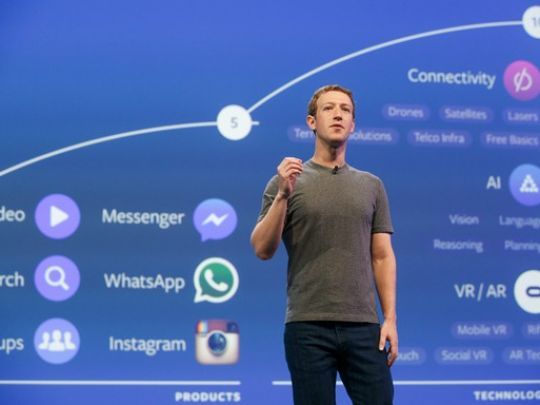
One area of concern is image capture, particularly when it comes to facial recognition, he says. “Biases can live in this data collection that represent the worst in society,” Horvitz says.
Another organization vowing to tackle AI’s dark side is the recently formed DeepMind Ethics & Society research group, which aims to publish papers focused on some of the most vexing issues posed by AI. London-based DeepMind was bought by Google in 2014 to expand its own AI work.
One of the group’s key members is Nick Bostrom, the Swedish-born Oxford University professor whose 2014 book, Superintelligence: Paths, Dangers, Strategies, first caused Musk to caution against AI’s dangers.
“My view of AI developments is, if it’s useful, use it, but maybe also be sure to participate in conversations about where this is all going,” says Bostrom, who adds that the world “doesn’t need more alarm sounding” but more dialog.
“We’re all full of hopes and fears when it comes to long term potential of AI,” he says. “We need to channel that in a constructive way.
Woz: From AI skeptic to fan
Apple cofounder Steve Wozniak initially found himself in the AI-wary camp. He, like Musk and Hawking, was concerned that machines with human-like consciousness could eventually pose a risk to homo sapiens.
But then he changed his thinking, based largely on the notion that humans still remain perplexed by how the brain works its magic, which in turn means that it would be difficult for scientists to create machines that can think like us
We may have machines now that simulate intelligence, but that’s different from truly replicating how the brain works,” says Wozniak. “If we don’t understand things like where memories are stored, what’s the point of worrying about when the Singularity is going to take over and run everything?”
Ah, yes, the Singularity. Glad he brought that up. That very sci-fi-sounding term refers to the moment in which machines become so intelligent they are able to run and upgrade themselves, leading to a runaway technological horse that humans will not be able to catch.
Some techies are eager for that machine-led moment. Last May, former Google self-driving car engineer Anthony Levandowski filed papers with the Internal Revenue Service to start a new religion called Way of the Future. Its mission is to promote the “realization, acceptance and worship of a Godhead based on Artificial Intelligence developed through computer hardware and software.”
Far from a joke, Levandowski — who is at the center of a contentious lawsuit between Google and Uber, to whom Levandowski sold his self-driving truck company Otto before being accused by Google of stealing proprietary tech — told Wired magazine last fall that his new church was merely a logical response to an inevitability.
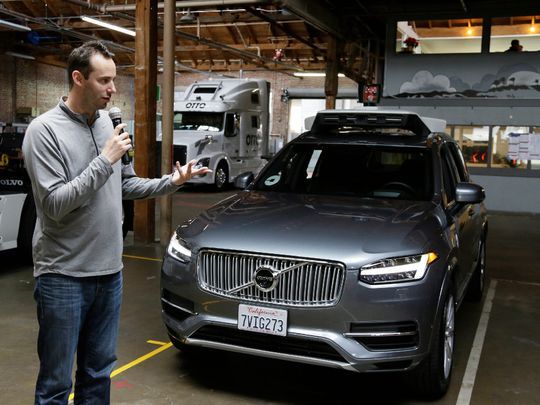 Anthony Levandowski, shown here during a briefing at a garage owned by his self-driving truck company Otto, which Uber bought in 2016
Anthony Levandowski, shown here during a briefing at a garage owned by his self-driving truck company Otto, which Uber bought in 2016
“It’s not a god in the sense that it makes lightning or causes hurricanes,” he said. “But if there is something a billion times smarter than the smartest human, what else are you going to call it?”
How about maybe, unnerving?
Most consumers remain wary
Results of a Pew Research Center poll released in October found that between half and three-quarters of respondents considered themselves “worried” when asked about AI’s impact on doing human jobs (72%), evaluating job candidates (67%), building self-driving cars (54%) and caring for the elderly (47%).
A SurveyMonkey poll on AI conducted for USA TODAY also had overtones of concern, with 73% of respondents saying that would prefer if AI was limited in the rollout of newer tech so that it doesn’t become a threat to humans.
Meanwhile, 43% said smarter-than-humans AI would do “more harm than good,” while 38% said it would result in “equal amounts of harm and good.”
Perhaps tellingly, 68% said that the real threat remains “human intelligence,” implying that technology harnessed for nefarious purposes is what could do the most harm.
U.S. researchers and scientists have no choice but to push forward with AI developments because inaction is not an alternative, says Oren Etzioni, CEO of the Allen Institute for AI, which was started by Microsoft cofounder Paul Allen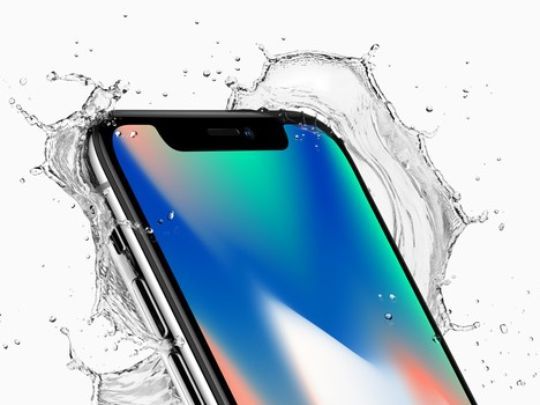 The iPhone X uses AI offline to protect user privacy
The iPhone X uses AI offline to protect user privacy
“AI may seem threatening, but hitting the pause button is not realistic,” he says. “China says they want to be an AI leader, and they’re not bothered by privacy issues. (Russian leader Vladimir) Putin has said the same thing. So the global race is on.”
As tech companies roar into 2018 with an eye toward improving their product offerings through AI, they would do well to remember that many of their constituents remain leery of technology that is overly intrusive and potentially harmful.
“Most people are smart enough to see that technology isn’t perfect and that we can’t trust these systems to make totally fair and correct decisions,” says Madeleine Clare Elish, a cultural anthropologist with Data & Society, a New York-based research institute.
Elish is encouraged that tech companies are starting to “see they have a responsibility not just to consumers but to society,” and are willing to discuss and monitor AI developments through various new organizations.
But her ultimate advice is for consumers, who for now still have the upper hand: “Data is the currency AI is built on, and it’s worth something. So maybe think twice before you give it away.”
courtesy= usatoday.com

